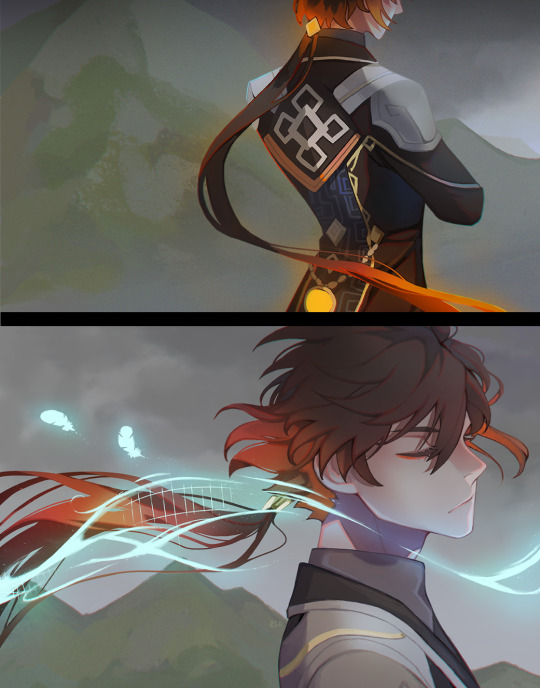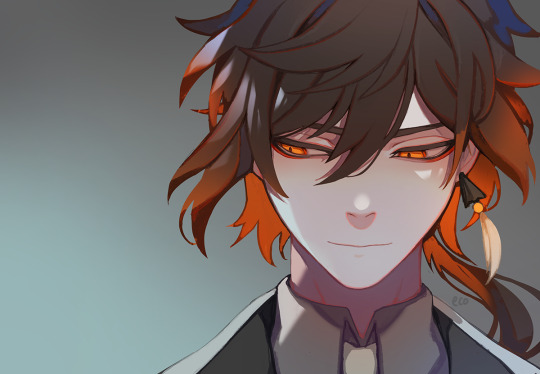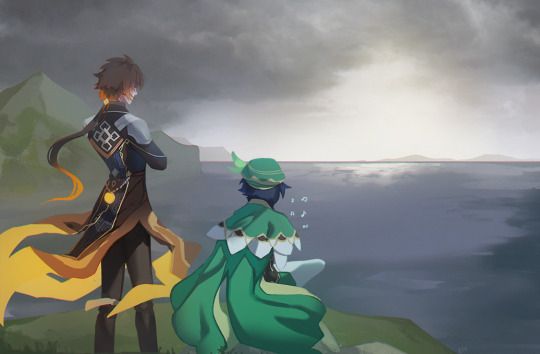Text
"wow ur so good at math" ah ha but you see. you dont ever get good at math. you stay bad, but now youre bad at harder math
11K notes
·
View notes
Text
[4.0]: A Theory On Rhinedottir, Alchemy, and the Meaning of Sin
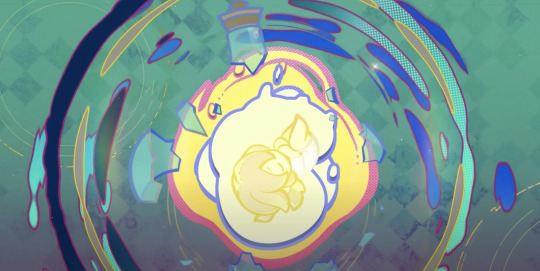
“One thought may end all calamity, and there will always be thoughts that may transcend time.” -The Meaning of Aeons “Separate the dust in the flames with joy, and extract the exquisite from the crude. For all in the universe comes from a single source, and all things may be derived from a single thought.” -Cinnabar Spindle
I’ve been wanting to do some Rhinedottir speculations for a while. With the new Ancient Colors world quest in Fontaine, I think now is a good time to propose a theory about this mysterious member of the Hexenzirkel, her approach to alchemy, and the reason she is a “sinner,” especially within the context of one of the Archon Quest’s central questions: what does it mean to be “born with sin”?
SPOILERS: Up to Act II of the Fontaine AQ (just Primordial Sea stuff), and Ancient Colors.
Although Rhinedottir is never mentioned by name in Ancient Colors, all of the signs of her are there: Mamere’s identity as an artist, Elynas’ otherworldliness and similarities to Durin, and the differences between the Melusine’s perception of the world and our perception of it (or their aesthetics, which we will touch on later). Ancient Colors is trying to remind us of Dragonspine and, if you were playing during this time, Shadows Amidst Snowstorms, and I believe it is doing so because it is key to the secret of the Primordial Sea and the prophecy of Fontaine.
We’ve heard Rhinedottir’s perspective only twice so far, and that was in the Windblume festival from this last year and in Cinnabar Spindle’s lore. Though we still don’t know much about her, she does identify herself as a “mother” of many children, and that she is raising the only son she has left. This, of course, is Albedo.
We also know that she is considered a "sinner" at the center of the Cataclysm who unleashed "an army of shadowy monsters" onto Teyvat, but we have very little grasp of what is exactly is meant by "sinner," and what if any consequences this title has had on her since then. Though every Hexenzirkel witch will be very important to uncovering the truth of Teyvat, Rhinedottir presents a particularly interesting case as the only one whose activities may have caused cataclysmic destruction, as opposed to Alice's general mischief and strange sense of humor.
It’s almost nothing to go off of, but I hope to demonstrate in this speculative theory that it’s more than enough to arrive at some answers.
Psychoanalysis 101, Round 2
To better explain what Durin, Elynas, and Rhinedottir’s other children are, we need to use an analogy rooted in Freud’s psychoanalytic theory of dream interpretation. This is a super TL;DR version of it and way oversimplified, but if you’re interested I wrote a more detailed theory about the significance of dreams in Genshin that has a full explanation of it there. (Also, it should be said that these were just Freud’s theories, please do not take any of the following as an accurate description of the human psyche and how it works. We are just having some fun for the sake of media analysis.)
Freud thought that dreams are the mind’s means of expressing unfulfilled wishes, and that the psychological purpose of dreaming is to “fulfill” those wishes. In A General Introduction to Psychoanalysis, he gives an example of this through a little girl’s dream where she was sailing on a lake: this dream was born out of an unfulfilled wish in her waking life, where she had to stop sailing on the lake despite wishing to continue. Hence, “I wish to sail on the lake” becomes “I am sailing on the lake” through the dream.
Further, Freud thought these unfulfilled wishes are “forgotten” in our unconscious mind when we are awake, censored by the ego to protect our conscious mind, but that at night this censorship is weakened. This is what allows a dream to occur while we sleep.
These unfulfilled wishes are often more complicated than a childish wish to keep sailing on a lake. Think about it this way: a wish is, at its core, a thought in our head, or a desire. What do we do with the thoughts we don’t like, the ones that are unbecoming of us or are unacceptable to fulfill?
We deny them.
Specifically, we repress them into the unconscious, where they are forgotten. Thing is, even if we temporarily forget these thoughts, they won’t just disappear from existence - they fester in the unconscious, waiting to be expressed. The dream, therefore, is the unfulfilled wish/repressed thought’s attempt to cross the boundary from the unconscious mind into the conscious mind - to be acknowledged, or indeed remembered.
“Unfulfilled Wishes”
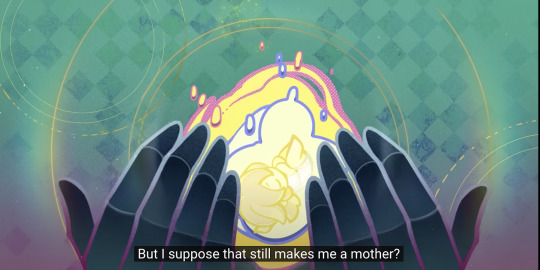
Making sense so far? If so, try to think of Teyvat like this: everything that is visible, everything above ground that the light touches and that can be perceived is like the ego and conscious mind. All of these things are what you’re aware of, things that you “know” and can make sense of, things that you understand, things that fit into rules and laws and order.
Now, think of everything in Genshin that is “unseen” and “unknown”: the Abyss, the spaces underground, forbidden knowledge, things that are “not from this world,” from beyond the firmament…these are like things from the unconscious mind, the repressed thoughts that we deny in ourselves because they may reveal a truth we are unwilling to face. These things are comparatively chaotic in nature, things we’d rather avoid, or things that we wish to forget.
We know that Elynas’ and Durin’s bodies are composed of matter that’s foreign to Teyvat, and that this is a major reason why they are incompatible with Teyvat and cause its destruction. This would make them more similar to a repressed thought, something that we don’t understand or know, and attempting to understand it destabilizes our sense of self, our “truth.” It follows that their home, the Abyss, is most similar to our unconscious mind, and Teyvat is most similar to our conscious mind.
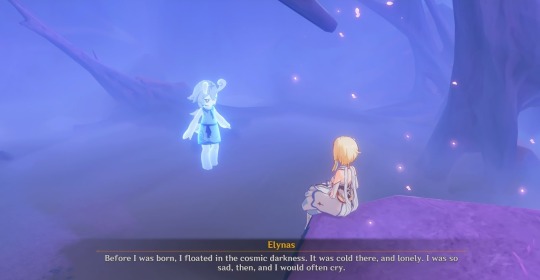
Elynas: Before I was born, I floated in the cosmic darkness. It was cold there, and lonely. I was so sad, then, and I would often cry.
So, as their mother, who or what is Rhinedottir in this analogy? Well, we can be a lot more specific than calling her a “sinner.” In fact, she’s a dreamer, and alchemy is the medium through which she “dreams”:
This was a story from long ago... Unborn life, unfulfilled wishes, Tragic dreams at the edge of the universal darkness that could never come true, Indwell my body, and descend unto this world. Then, my lovely children, Like rainwater flowing into creeks, and plants growing towards the sun, Go unto a lovely place, and display your own beauty there with pride. This is a memory, a memory that a child named Durin had of his mother… "Thank you, Mother, thank you." "You gave me wings to soar and a mighty form." "Mother, I wish to go to a land of lovely songs," "I will tell them about you, Mother, and about everyone else." "I shall tell them that the place where I was born is beautiful." -Festering Desire
Rhinedottir’s children, then, are like thoughts or ideas that she is bringing to life, or “making conscious,” by moving them from the Abyss to Teyvat. It may even be the reason why the sword from The Chalk Prince and the Dragon is called Festering Desire in the first place - it’s a reference to the idea of repressed thoughts, wishes, and desires festering in the unconscious.
Should the analogy hold true, it provides some insight into what her intentions may have been in creating her Abyssal dragons. But before that, we need to take a little detour into Enkanomiya and brush up on some lore.
Denouement of Sin
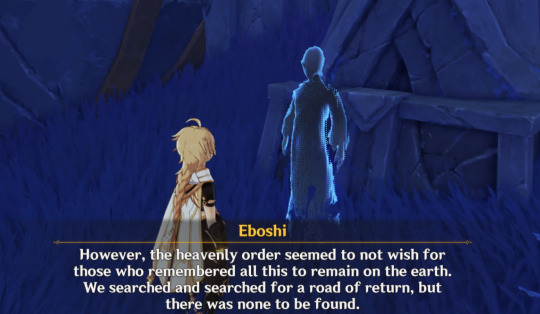
Eboshi: However, the heavenly order seemed to not wish for those who remembered all this to remain on the earth. We searched and searched for a road of return, but there was none to be found.
Remember these hologram-looking dudes? They are the Shades of Tokoyo, also known as Sinshades. They are described as afterimages of the former citizens of Byakuyakoku preserved by Istaroth’s favor, specifically those citizens’ most powerful emotions, and they are only visible during Evernight:
Eboshi: Due to the phenomenon known as Sinshades, the “past,” “history,” and “truth” of Enkanomiya would endure even if left to their own devices. Eboshi: As such, great effort was expended, not that we might remember, but that we might “forget.” Lady Sangonomiya was of this view.
Like a dream, Sinshades only appear at night, and they are a kind of embodiment of history or “truth” that Watatsumi Island has chosen to forget, representing the thoughts and emotions of those who once lived in Enkanomiya. Using Freud’s theory of dream interpretation as a framework, Enkanomiya then functions as Watatsumi Island’s unconscious mind.
Put another way, if all Sinshades are the result of strong emotions preserved in time through Istaroth’s favor, then those emotions are like thoughts, and that would make the Sinshade a “physical” form or expression of those thoughts. So, when we call the afterimages the “Sins of Tokoyo,” we are in effect calling them the “Dreams of Tokoyo,” because they are the thoughts and emotions of Enkanomiya given form, and that’s what dreams do: they convey thoughts and feelings through a series of images.
Through the Sinshades, we see an implicit association with the concepts of dreaming and sinning in Genshin’s worldbuilding, and through them we understand that they are not so different from one another.
A Brief Note on Aesthetics
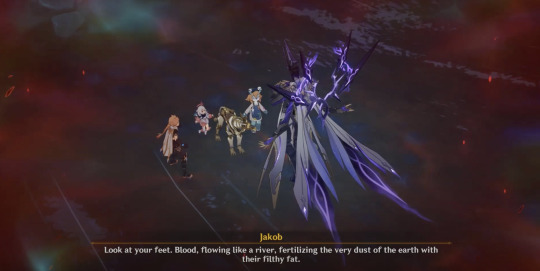
Jakob: Look at your feet. Blood, flowing like a river, fertilizing the very dust of the earth with their filthy fat.
It may have struck you how various Melusine perceived reality in a way that greatly differs from the things we see, as if at times their perception was “flipped,” if not somewhat strange. By the end of Ancient Colors, it’s clear that this is due to the Melusine being born of Elynas, who is not from this world. A similar phenomenon can be seen in both Durin and Elynas, the former imagining itself dancing with the people of Mondstadt before it “woke up” from this dream to Dvalin’s fangs in its neck, and the latter realizing that the things that it finds fun are destructive and harmful to the people of this world.
This is a part of the commentary present in several world quests and commissions in Fontaine that deal with “aesthetics,” or one’s own sense of beauty. Aesthetics are principles that differ on both large and small social scales, varying between groups of people and between individuals (see Salsa’s and Ubu’s aesthetic disagreement), and they can change throughout time as values change. In other words, they are informed by perspectives.
For example, think of what we know so far about the Primordial Sea. Neuvillette wonders how the Primordial Sea could be capable of giving life and then “suddenly reversing itself” so that it instead “devours life,” but this is just his judgment of what the sea does, and ultimately his perspective. Many others view the properties of the Primordial Sea differently from him: to them, the prophecy is comforting because it signals a “return,” or a “homecoming.” To take it a step further, Neuvillette may be making an assumption by stating that the sea has reversed itself. Perhaps this is just how the sea is, perhaps this is its “truth.”

Verenata: The "truth" will not be limited or constrained by the eyes and perspectives of the viewer, and won't be distorted by what is in their heart. It objectively exists, and it just is...like the white sand, like the bones of seastars, like the waves that crash and pound...those are "truth."
But I don’t need to tell you that differences in perspective aren’t always a comfortable experience. Just look at Jakob, who saw the rushing currents in Elynas as its blood. To the player, who has been swimming around in that for a couple of hours by that point, this idea is horrifying. However, when we consider Jakob’s perspective, his “truth,” it undoubtedly expands our understanding of Elynas as a being that is dead, so to speak, but that is also capable of being revived given the appropriate stimulus. Jakob’s "truth" broadens our perspective and deepens our understanding.
So if we return to the other ever-present metaphor of alchemy as a form of painting, we can also see that Rhinedottir’s aesthetic sense greatly differs from what is acceptable and compatible with Teyvat. But, just like Mamere, she paints regardless of whether her paintings are understood by a greater audience. In time, aesthetics may change again, and perhaps her art will be received differently when that time comes.
Concluding Thoughts
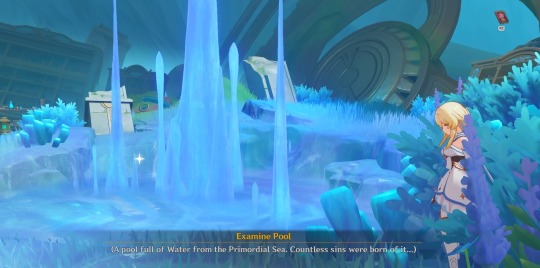
(A pool full of Water from the Primordial Sea. Countless sins were born of it…)
So, that is why I think Rhinedottir was deemed a sinner. She sinned by “dreaming” up these chaotic life forms that were not from this world, bringing them into being through the Art of Khemia, and telling those chaotic life forms that they were beautiful, too, that the ordered and lawful world of Teyvat just needed to realize how beautiful they were. Maybe Rhinedottir was dreaming of a new world, one where her children’s wishes could be fulfilled, where they could exist with everyone, and maybe creating that world required the destruction of this one. You could also think of her as someone who has introduced “external variables” into Teyvat, which, hmmm..:
“...No matter how many times I derive it, the result remains the same, though this result is not expected... Unlike the world depicted in these ancient texts, there will be no more new civilizations born... Unless we consider introducing "variables" from outside the system... If it was that sort of power, there might be a chance…” -Enigmatic Page I, Book of Esoteric Revelations
In this way, her “children” (thoughts) were all “born with sin,” or are born from sin (dreams). If Rhinedottir is a dreamer, then alchemy is the way that she dreams: it allows her to give forms to these thoughts. And if you buy that, then there are some serious implications to consider from this whole notion of Fontainians being “born with sin,” and just what exactly the Primordial Sea might be. Definitely something to think about while we wait for 4.1.
One last point that is more of an aside than anything else: Rhinedottir’s only remaining child is Albedo, but through this lens we see that he is not just the culmination of the Primordial Human Project, the creation of a human through the power of alchemy, but also the only known example of Rhinedottir’s “ideas” that coexists with Teyvat as it is now. As for her known extant grandchildren, they have integrated with Fontainian society and don’t seem to cause them any trouble. I wonder if she knew something like that could happen?
But…that’s just my take on it so far. What do you think?
(also, fun fact: there is a parallel storyline to this one unfolding in Honkai Star Rail right now as it relates to being deemed a “sinner” for creating life, and another parallel storyline in Honkai Impact 3rd about creation and rebirth and “returning home to the sea” and I just love when Hoyoverse connects their games like that)
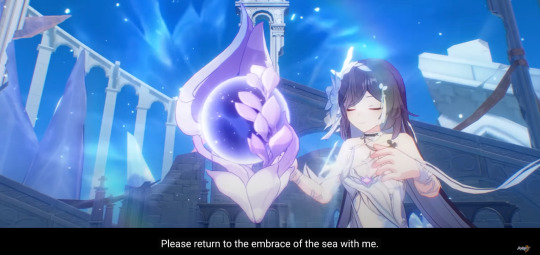
Sources
A General Introduction to Psychoanalysis by Sigmund Freud
267 notes
·
View notes
Text
Be nice to people, you never know who's gonna end up as a serial killer with a grudge if they ever see you again.
90 notes
·
View notes
Video
Seok yeon: Escribi el rap anoche y no soy muy bueno. No te burles de mi hyung. 😊
23 notes
·
View notes
Photo

© Electric Half Time ♡ do not edit or crop logo.
12 notes
·
View notes
Photo

© Electric Half Time ♡ do not edit or crop logo.
12 notes
·
View notes
Text
Minhyuk Talk Tok Update 200124
이번 설에는 말이에요
For this coming Lunar New Year
- 담비는 아쉽게도 못보여줄거같아요~
I’m afraid I can’t show you Dambi (this time)~
- 담비가 좋은곳으로 가서 그래요
It’s because Dambi went to a good place
- 사실 좀 되었어요 시간이
Actually, it’s been a while now
- 힘든일이랑 겹쳤어서 더 마음아팠는데 우리몬베베들도 알고 같이 행복하라고 빌어줘요!
It was combined with other difficult things so I was more hurt but I wanted Monbebe to know and pray for Dambi’s happiness!
- 몬베베들이 예뻐해줘서 더 행복하게 갔을거에요!
Dambi would be able to leave happier if Monbebe wish (Dambi) well!
- 얘기할까말까 고민했는데 그냥 얘기하구 몬베베도 같이 행복 빌어줬으면 좋겠어서 ㅎㅎ
I was wondering if I should talk about it or not but I decided to do it, I hope Monbebes will be able to wish (Dambi) happiness together ㅎㅎ
- 연휴 잘보내요 몬베베!
Have a good holiday, Monbebe!
- I.M comment: 담비야 민혁이형 옆에 있어줘서 고마워 행복하게 잘 뛰고 놀아야해
Dambi-ya, thank you for being beside Minhyuk hyung You have to run and play happily
- HW comment 200125: 우리 담비
Our Dambi
(translation credit)
159 notes
·
View notes
Text
Woojin: How long has it been since you've slept?
Chan: What makes you think I didn't sleep? Look, I'm making lunch right now.
Woojin: [Looks at the camera with tired eyes as Chan spread toothpaste on a tortilla with a fork]
649 notes
·
View notes

